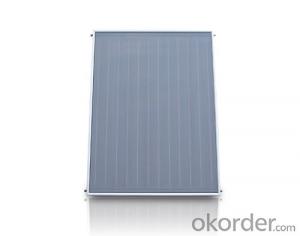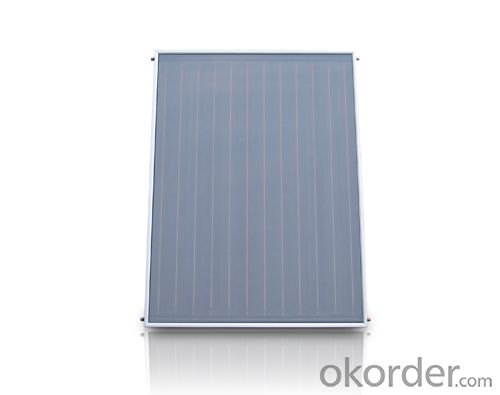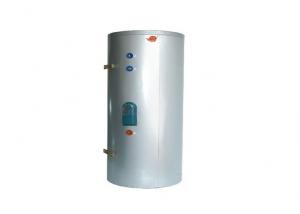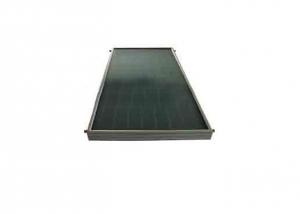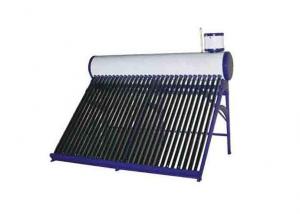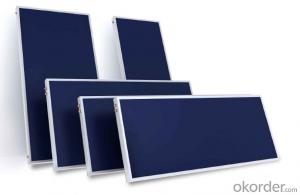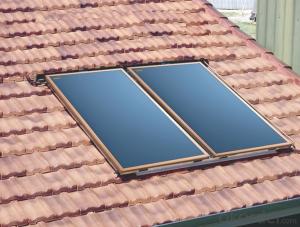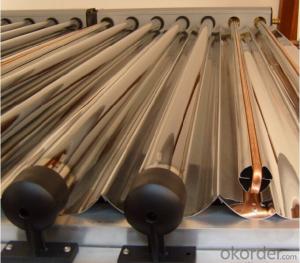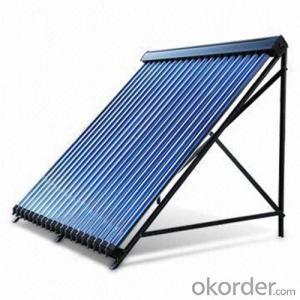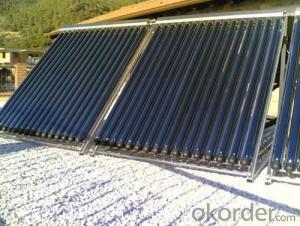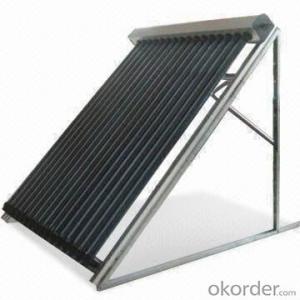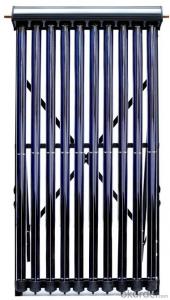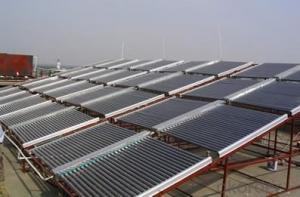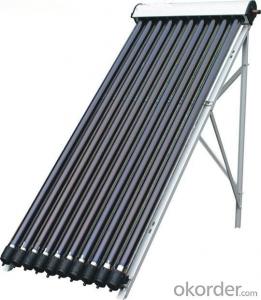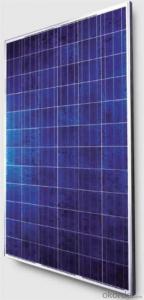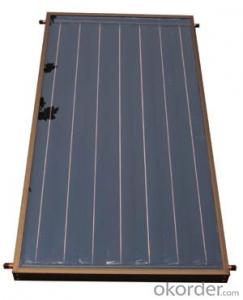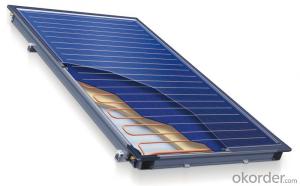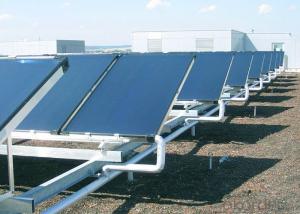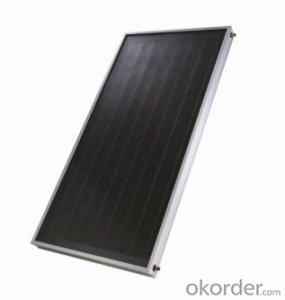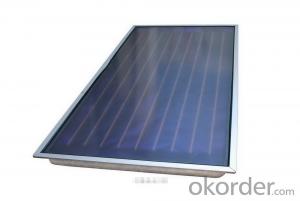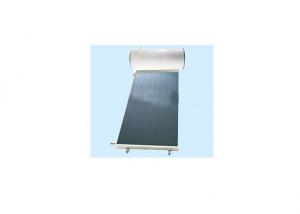Aurora Solar Collectors Hot Solar Evacuated Tube with Heat Pipe Solar Thermal Collector, Model No:FP-GV2.05-01-A
- Loading Port:
- Shanghai
- Payment Terms:
- TT OR LC
- Min Order Qty:
- 500 pc
- Supply Capability:
- 10000 pc/month
OKorder Service Pledge
OKorder Financial Service
You Might Also Like
HOT Solar EVACUATED TUBE WITH HEAT PIPE SOLAR
THERMAL COLLECTOR
Model No:FP-GV2.05-01-A ( 2015*1015*76mm)
Solar Collector Characteristics:
♦Germany imported blue titanium selectve coating,the most efficient absorber in the world
♦ Whole plate laser welding,to minimize the damage to absorption layer and copper tube
♦ 25 years lifespan
♦ Advanced processing technology and equipment,to guarantee products in high quality
Quality Assurance--Solar Collector Test
Internal pressure for absorber
* High temperature resistance
* Exposure test
* External thermal shock
* Internal thermal shock
* Rain penetration
* Mechanical load test
* Thermal performance
* Freeze resistance test
* Ice ball impact test
In-process
-Laser welder between absorber and copper tubing
-Process test with digital pressure meter at 1.2Mpa 5 minutes
-Automatic S type bending machine
-Automatic frame cutter
-Automatic frame assembly machine
-Automatic copper drilling machine
-Automatic plate leveling machine
Specifications:
Dimension L×W × H(mm):2015*1015*76mm
Gross Area(m²):2.05 m²
Absorber Area (m²): 1.82 m²
Number of covers:1
Cover material:Low iron tempered glass
Cover Thickness(mm):3.2mm
Cover Transmittance:>92%
Weight:41.5 Kg
Absorber:
Material:Aluminium board
Surface Treatment:Sputtering(Germany imported Blue titanium coating)
Absorptivity:95±2%
Emissivity: 5±2%
Construction Type:Grid type
Header Material:Copper TP2/CA1220
Header tube Size:Ø22mm x (thickness) 0.8 mm
Riser tuber size: Ø8mm x (thickness) 0.75mm
Working pressure: 0.75MPa
Test pressure: 1.2MPa, keeps 30 minutes
Whole Collector:
Maximum power, G = 1,000W/m² per collector: 1.352 kW
Thermal efficiency: 0.788
Heat loss coefficient (a1): 3.411 W/m².K
Heat loss coefficient (a2): 0.024 W/m².K
Maximum stagnation temperature for ambient conditions of 1,000W/m² and 30°C: 188.4°C
Thermal Insulation:
Insulation material: fiberglass
Insulation thickness: 35 ± 5mm
Insulation Density: 48 kg/cube
- Q: Can solar collectors be used for generating electricity on escalators?
- Solar collectors, unfortunately, cannot be utilized for the purpose of generating electricity on escalators. Their primary function is to capture sunlight and convert it into thermal energy, which is commonly employed for heating water or air. These collectors are not specifically designed to directly produce electricity. Due to their inability to generate the required power output for high-demand applications like escalators, they cannot serve as a continuous and reliable power source. Moreover, considering that escalators are generally situated indoors where the availability of sunlight may be limited, the feasibility of employing solar collectors for this particular purpose is further diminished.
- Q: Can solar collectors be used for generating electricity on smartphones?
- No, solar collectors cannot be directly used for generating electricity on smartphones as they require a much larger surface area to generate sufficient power. However, solar panels can be used to charge portable power banks or other small devices, which can then be used to charge smartphones.
- Q: Are there any limitations to the lifespan of solar collectors?
- Yes, there are limitations to the lifespan of solar collectors. These limitations can vary depending on several factors such as the quality of materials used, maintenance practices, and environmental conditions. However, on average, solar collectors can typically last for 20 to 30 years before their efficiency begins to decline. Regular maintenance and proper care can help extend their lifespan.
- Q: What is the payback period for a solar collector installation?
- The payback period for a solar collector installation is the amount of time it takes for the savings from reduced energy costs to equal the initial investment made for the installation.
- Q: Can solar collectors be used for generating electricity on elevators?
- Using solar collectors to generate electricity on elevators presents several considerations. Firstly, efficient electricity generation requires direct sunlight, but elevators are typically enclosed within buildings or shafts, limiting sunlight availability. The constant movement of elevators also creates shadows, further reducing exposure to sunlight. Additionally, solar collectors are typically installed on rooftops or open areas to capture maximum sunlight. Mounting them on elevators would require specific engineering and design considerations to ensure proper positioning and orientation for adequate sunlight. Continuously adjusting the position and angle of the solar collectors would also be necessary to optimize their efficiency as the elevator moves. Furthermore, the limited space on elevators poses a challenge. Solar collectors require sufficient surface area to generate significant electricity, which may not be feasible on the limited surface area of an elevator. Moreover, elevators have varying power requirements, and solar collectors may not generate enough electricity to meet these needs consistently. Installing energy storage systems or alternative power sources would be necessary to ensure a reliable power supply. In conclusion, while it is technically possible to use solar collectors for elevator electricity generation, challenges such as sunlight availability, limited space, and varying power requirements must be addressed through extensive engineering and design considerations to make it a viable solution.
- Q: Can solar collectors be used for heating large buildings?
- Yes, solar collectors can be used for heating large buildings. Solar collectors, such as solar thermal systems or solar water heaters, can efficiently capture sunlight and convert it into heat energy. This heat energy can be utilized to warm up water or air, which can then be circulated throughout the building to provide heating. By harnessing the power of the sun, solar collectors offer a sustainable and cost-effective solution for heating large buildings while reducing reliance on traditional fossil fuel-based heating systems.
- Q: What materials are solar collectors made of?
- Solar collectors are typically made of materials such as glass, metal, and plastic.
- Q: Are there any limitations to using solar collectors?
- Yes, there are a few limitations to using solar collectors. One limitation is that solar energy is intermittent and depends on sunlight availability, making it less reliable during cloudy weather or at night. Additionally, solar collectors require a large surface area to generate significant amounts of energy, which may not be feasible in densely populated areas. Another limitation is the initial cost of installing solar collectors, which can be relatively high compared to traditional energy sources. However, advancements in technology and government incentives are continuously addressing these limitations, making solar collectors a promising renewable energy solution.
- Q: Can solar collectors be used for heating commercial buildings?
- Yes, solar collectors can be used for heating commercial buildings. Solar thermal collectors can capture the sun's heat and transfer it to a building's heating system, providing a renewable and sustainable source of heat. This can help reduce energy costs and carbon emissions associated with heating commercial buildings. Additionally, solar collectors can be integrated into existing heating systems or used as standalone systems, depending on the specific requirements of the building.
- Q: What maintenance is required for solar collectors?
- Regular maintenance is required for solar collectors to ensure optimal performance. This includes cleaning the panels to remove dirt, dust, and debris, inspecting for any damage or leaks, checking the fluid levels and pressure in the system, and monitoring the overall efficiency. Additionally, it is recommended to have a professional inspection and tune-up every few years to address any potential issues and maximize the lifespan of the collectors.
Send your message to us
Aurora Solar Collectors Hot Solar Evacuated Tube with Heat Pipe Solar Thermal Collector, Model No:FP-GV2.05-01-A
- Loading Port:
- Shanghai
- Payment Terms:
- TT OR LC
- Min Order Qty:
- 500 pc
- Supply Capability:
- 10000 pc/month
OKorder Service Pledge
OKorder Financial Service
Similar products
Hot products
Hot Searches
